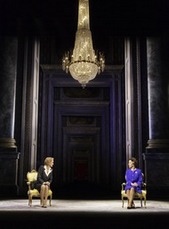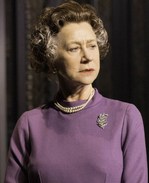SITE GUIDE
SEARCH
REVIEWS
REVIEW ARCHIVES
ADVERTISING AT CURTAINUP
FEATURES
NEWS
Etcetera and
Short Term Listings
LISTINGS
Broadway
Off-Broadway
NYC Restaurants
BOOKS and CDs
OTHER PLACES
Berkshires
London
California
New Jersey
DC
Connecticut
Philadelphia
Elsewhere
QUOTES
TKTS
PLAYWRIGHTS' ALBUMS
LETTERS TO EDITOR
FILM
LINKS
MISCELLANEOUS
Free Updates
Masthead
Writing for Us
A CurtainUp  London Review
London Review
 London Review
London ReviewThe Audience
|
Well I had no 'O' levels at all. What fine hands the country is in!
— Her Majesty the Queen in response to Prime Minister John Major's confession that he has only 3 'O' levels. Note for our American readers: 'O' levels were the examinations taken at 16 where the average grammar school pupil might achieve 8 'O' levels, five being the prerequisite minimum for entering a Sixth Form.
|

Margaret Thatcher (Haydn Gwynne) and the Queen (Helen Mirren)
(Photo: Johan Persson) |
We feel now that author Peter Morgan could singlehandedly see the Queen's popularity soar due to the way she is portrayed in The Audience. She is witty, affectionate, tolerant and caring of her commonwealth.
A low ebb for her is in the play when confronted by Margaret Thatcher (Haydn Gwynne), a popular villainess, who doesn't believe that sanctions will bring Apartheid South Africa, to conform to world opinion and grant the majority of its population voting rights. Thatcher is challenged by the Queen about the shocking statement made about the meetings of the Prime Ministers of Commonwealth Countries acronym CHOGM (Commonwealth Heads of Government Meeting) that they are "coons holidaying on government money". Margaret retorts, "That was Denis!" As if her husband saying it, in any way excuses it.

Helen Mirren
(Photo: Johan Persson) |
What is remarkable is that Helen Mirren plays the queen from age 25 in 1952 on her succession to the throne to today in her eighties. The scenes are not in chronological order and only 8 out of the 12 prime ministers feature and not in chronological order. The Audience is the weekly briefing meeting that the Queen has on a Tuesday with her current prime minister. As a constitutional monarch, she is unable to disagree with the policy of her government and Thatcher takes her to task when the Sunday Times publishes opinions said to come from "sources close to the Queen" — that she finds her government to be uncaring, lacking in compassion and socially divisive.
Mirren portrays the queen at various ages: We see her in her sixties, with brown hair greying at the sides, empathetically receiving John Major (a wonderfully self deprecating, self effacing Paul Ritter) who cannot quite grasp how he has been propelled to such heights of government. We see the 25 year old being shown the ropes by the sonorous Winston Churchill (Edward Fox, who is a few stone short of suspending disbelief but who sounds magnificent). The Queen expresses her wish to take her husband's name like other young wives, and be called Mountbatten not Windsor, but Churchill points out in this decade after the Second World War fought against Germany, that his surname should really be Schleswig-Holstein-Sonderberg-Glucksberg.
The short scenes in between each prime minister are filled with the Young Elizabeth (Bebe Cave/Maya Gerber/Nell Williams) giving insights as to her preparation for a life time of service as next in line to the throne after her father became king in 1938. This is all the time that Mirren has to change her dress, her wig, her makeup, her body shape and stance to convince us that this is the queen from another era. In one scene she changes on stage, shielded by equerries, from the white gown and tiara for a formal portrait by photographer Cecil Beaton to the blue suit she wears to greet Mrs Thatcher. Very clever!
Harold Wilson (Richard McCabe), the Gannex mac wearing Yorkshire man and socialist prime minister unexpectedly turns out to be a favourite of the queen, and the only one since Churchill to be honoured with her and Prince Philip attending dinner at his residence at 10 Downing Street. We see Wilson three times, once in London on the first occasion of their meeting when as a rough diamond he raises the topic of the class war. He has a parliamentary majority in single figures. Secondly in Scotland, Balmoral where he impresses with a photographic memory of pages in a hard to find book. Hard to find because apparently reading is not a popular royal pursuit. But we do see the royal corgis, favourite dogs of the queen and her mother. On the last occasion Wilson is concerned he has Alzheimers and knows he will soon have to resign.
There is so much to laugh at in The Audience. I find myself giggling thinking about the Queen nodding off while the current Prime Minister David Cameron (Rufus Wright) drones on and on. A topical joke for 2013 is when she tells someone that, "there is no abdicating or retiring, like the Pope!" The most serious crisis here is not 1997 but Suez in 1956 with the handsome Sir Anthony Eden (Michael Elwyn) in charge but his judgment is called into question. The Scotsman Gordon Brown (Nathaniel Parker) is tactless and inept but the queen takes pity on him and shares a joke about the social climbing Blairs turning up at Balmoral in brand new tweeds with the price tags still on them. James Callaghan (David Peart) makes a brief appearance but only as the PM everyone forgets. Blair, Heath, Macmillan and Alec Douglas Home don't make the cut.
Stephen Daldry has done a magnificent job directing: the self important body language of Margaret Thatcher as she rushes in clutching the handbag and we can clearly see that the queen is irritated by her. Bob Crowley seems to be the designer of choice for these large state rooms and the magnificent chandeliers and Rick Fisher's lighting changes the mood from the scene of the audience to the flashbacks of a childhood in Glamis Castle in Scotland with the Scots nanny, Bobo MacDonald (Charlotte Moore).
I would like to know the American reaction to this play especially from anyone who hasn't keep abreast of British politics of the last 60 years. On June 13th NT Live will film this production for worldwide later streaming and screening.
The Queen's own PR machine could not do more for her standing than this play. She appears compassionate and caring for her prime ministers, loyal to her sense of duty and at the end I wished we had stood up and sung the National Anthem and cheered. Instead we saw the current theatrical accolade, a sincere, standing ovation for the magnificent Helen Mirren.
|
Subscribe to our FREE email updates with a note from editor Elyse Sommer about additions to the website -- with main page hot links to the latest features posted at our numerous locations. To subscribe,
E-mail: esommer@curtainup.comesommer@curtainup.com
put SUBSCRIBE CURTAINUP EMAIL UPDATE in the subject line and your full name and email address in the body of the message -- if you can spare a minute, tell us how you came to CurtainUp and from what part of the country. |
| The Audience
Written by Peter Morgan Directed by Stephen Daldry Starring: Helen Mirren With: Paul Ritter, Richard McCabe, Edward Fox, Haydn Gwynne, Michael Elwyne, Nathaniel Parker, Rufus Wright, David Peart, Geoffrey Beevers, Bebe Cave/Maya Gerber/Nell Williams, Harry Feltham, Matt Plumb, Spencer Kitchen, Elaine Solomon, Jonathan Coote, Ian Houghton, Charlotte Moore Designed by Bob Crowley Composer: Paul Englishby Lighting: Rick Fisher Sound: Paul Arditti Video: Ian William Galloway Hair and Make-up Designer: Ivana Primorac Running time: Two hours 25 minutes including an interval Box Office: 0844 482 5130 Booking to 15th June 2013 Reviewed by Lizzie Loveridge based on 7th March 2013 performance at the Gielgud Theatre, Shaftesbury Avenue, London W1D 6AR (Tube: Leicester Square/Piccadilly Circus) |
|
REVIEW FEEDBACK Highlight one of the responses below and click "copy" or"CTRL+C"
Paste the highlighted text into the subject line (CTRL+ V): Feel free to add detailed comments in the body of the email . . . also the names and emails of any friends to whom you'd like us to forward a copy of this review. |




